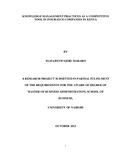| dc.description.abstract | Although Knowledge Management is not a new discipline, it is not until the recent years that became popular as a discipline and an opportunity for competitive advantage. There are claims that knowledge has become one of the most important factors for success, and that companies need to capture and maintain it. Thus, more and more organizations are considering and dedicating resources to knowledge management. The goals and expected outcomes of an organization with effective knowledge management include improved organizational effectiveness, improved productivity, a way to capture best practices, improved decision making, becoming a more innovative organization and a source of competitiveness and improved performance. Knowledge and competence have become the primary drivers of competitive advantage; and to the extent that knowledge and capabilities are unique and difficult to imitate, they confer sustainable competitive advantage on the firm. The overall purpose of knowledge management is to maximize the enterprise‟s knowledge related effectiveness as well as to maximize returns from its knowledge assets. Insurance firms in particular are able to appreciate the use of knowledge management since knowledge within the insurance -firm is their competitive advantage. They are faced with the necessity of continuously updating their employee‟s knowledge and promote constant learning since knowledge in policies is what an insurance firm sells (Dunford 2000; Villalba 2006). The specialized knowledge within insurance firms is the reason why they delegate their staff‟s specific jobs in various field (medical, manufacturing schools) in selling their policies. By following knowledge management strategies, insurance companies can maximize the employee‟s competence and as well, the organizations level of knowledge as a whole. There are many positive advantages of using knowledge management, such as gaining competitive advantage or its competitors, maximize the efficiency within the organization. The aim of this research is to find out if insurance companies in Kenya are using knowledge management tools as a means of attaining competitive advantage in the industry. Descriptive statistics technique was used to analyze the quantitative data. Coding was done in SPSS, analyzed Thematic technique was applied in analysis of qualitative data | en |

